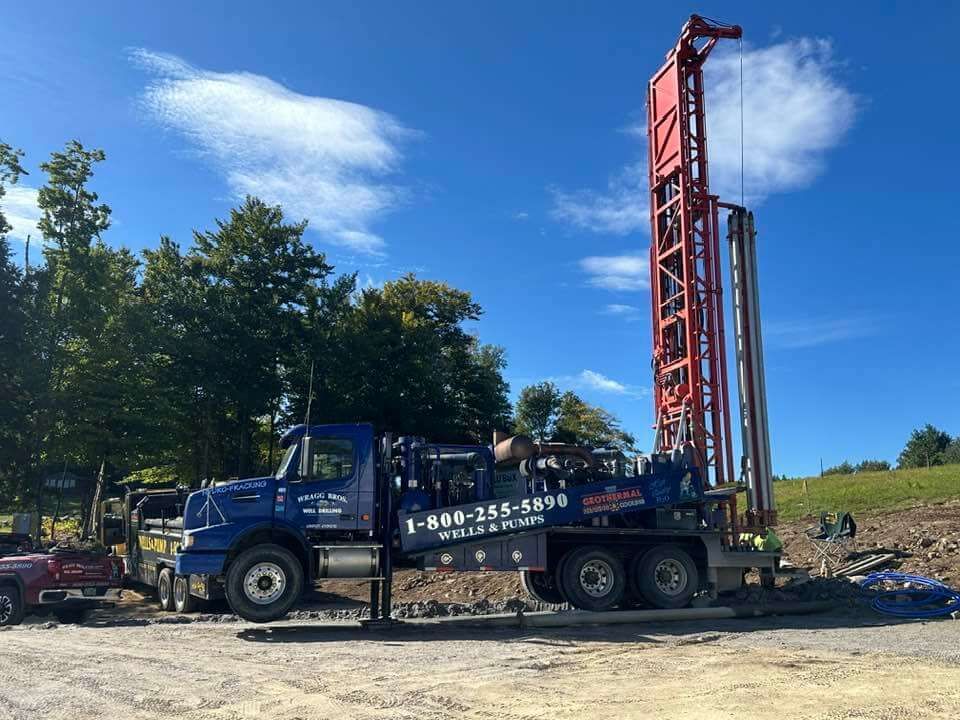What is a Closed Loop Geothermal System: The Future of Sustainable Energy
A closed loop geothermal system is an efficient way to heat and cool your home using the Earth's natural temperatures.
This comprehensive guide will explain how it works, its advantages, and how it compares to other geothermal systems.
Key Takeaways
Closed loop geothermal systems utilize a sealed loop of pipes to harness the earth's stable temperatures for efficient heating and cooling, eliminating reliance on local water sources. Homeowners benefit from significant energy savings, reduced greenhouse gas emissions, and long-term sustainability, with systems designed to last over 50 years. Proper installation and site assessment are crucial for maximizing the efficiency of closed loop geothermal systems, which offer adaptability for various property sizes and conditions.
What is a Closed Loop Geothermal System?
Closed loop geothermal systems are a marvel of modern engineering, designed to harness the earth's stable temperatures for heating and cooling purposes. Unlike open loop systems that pull water directly from natural sources, closed loop systems use a continuous loop of pipes filled with a water-based solution to transfer heat. This makes them incredibly versatile, as they do not rely on local water availability and can be installed on various property sizes.
At the heart of a closed loop geothermal system is the geothermal heat pump, an ingenious device that provides both heating and cooling for buildings. Connecting to an indoor geothermal heat pump, these geothermal heat pump systems enhance thermal comfort and control humidity, making them suitable for almost any location in the U.S.
One of the standout features of closed loop systems is their adaptability. They can be installed in different configurations, such as horizontal, vertical, or in ponds or lakes, depending on the available land and specific site conditions. This flexibility ensures that homeowners can take advantage of geothermal energy regardless of their different location.
Closed loop geothermal systems offer a reliable and efficient way to harness geothermal energy for modern heating and cooling needs. Utilizing the consistent temperatures found just below the earth's surface, these systems ensure year-round comfort and significant energy savings.

Key Benefits for Homeowners
Homeowners can benefit significantly from closed loop geothermal systems, particularly in terms of cost savings on energy bills. These systems offer energy savings of 30% to 70% on heating costs compared to conventional systems, and energy savings of 20% to 50% on cooling costs compared to conventional systems. They provide enhanced energy efficiency along with various incentives and rebates that make the initial investment more manageable.
Beyond the financial savings, closed loop geothermal systems offer substantial environmental benefits. They do not emit fossil fuels, significantly reducing greenhouse gas emissions. Studies indicate a reduction in emissions by up to 44% compared to traditional air-source systems. This makes them an attractive option for environmentally conscious homeowners looking to reduce their carbon footprint.
Customer testimonials often highlight the improved comfort levels and consistent indoor temperatures achieved through these systems. The efficient operation of closed loop geothermal systems, installed by experts like Wragg Brothers, ensures a pleasant living environment with better thermal comfort and humidity control.
A closed loop geothermal system can be an excellent solution for homeowners seeking sustainable and cost-effective heating and cooling.
The Technology Behind Closed Loop Geothermal Systems
The technology behind closed loop geothermal systems is both fascinating and highly efficient. These systems utilize a continuous circulation of a heat transfer fluid through underground pipes made of durable plastic. A heat transfer solution that is filled only once, minimizing the amount needed for operation, ensures a sustainable heat exchange process through the system's design.
A sealed downhole heat exchanger circulates the working fluid, effectively collecting and transporting heat as fluid flows. This setup allows the system to adapt to a broader range of temperatures and hot rock types, making it more versatile than traditional geothermal systems. The adaptability of closed loop systems significantly increases the potential to extract heat for geothermal energy production by accessing previously untapped resources.
Heat exchange in closed loop systems occurs regardless of outdoor temperature, ensuring year-round climate control. Geothermal heat transfers through the underground pipes to the heat pump, which then distributes it throughout the building, providing consistent and efficient heating and cooling using the earth's natural thermal energy.
The advanced technology behind closed loop geothermal systems enhances their efficiency and broadens their applicability. By leveraging the earth's stable temperatures and innovative heat exchange mechanisms, these systems provide a reliable and sustainable energy solution for modern homes.

Installation Process
Installing a closed loop geothermal system begins with a comprehensive site assessment. This initial evaluation is crucial for understanding soil conditions, space requirements, and the overall feasibility of the system. The assessment helps design a loop system layout that aligns with the specific characteristics of the property and homeowner preferences.
After the site assessment, the next step involves drilling for the vertical loops. This process includes using specialized equipment for drilling, with drilling duration typically taking one to three days, depending on the number of wells needed. Installing pipes in the ground after drilling and connecting the pipes to a heat pump completes the loop for heat exchange.
The final phase of the installation includes rigorous testing to ensure there are no leaks and that the system operates efficiently. After confirming the system's functionality, the ground is covered, leaving minimal visible impact on the landscape. Continual advancements in drilling technologies aim to reduce costs and enhance the efficiency and reach depths of geothermal wells.
Though intricate, the installation process is a one-time investment that promises long-term benefits. Properly installed and designed, closed loop geothermal systems can provide decades of efficient and sustainable heating and cooling.
Maintenance and Longevity
A standout feature of closed loop geothermal systems is their longevity. The underground loops are designed to remain functional for over 50 years, with some systems lasting up to 100 years. This durability, combined with the longer lifespan of geothermal heat pumps compared to standard HVAC units, makes these systems a reliable long-term investment.
Geothermal systems generally require less maintenance than traditional HVAC systems, resulting in lower long-term upkeep costs. Regular leak detection and filter cleaning are essential to extend the life of a geothermal system and ensure its efficient operation. Promptly addressing any leaks or issues in the piping can significantly enhance the system's longevity.
The durability and efficiency of geothermal systems are influenced by factors such as correct installation, environmental conditions, and ongoing maintenance practices. Proper installation and design ensure that geothermal systems not only perform efficiently but also provide long-term cost savings.
Comparing Closed Loop and Open Loop Systems
Several key differences stand out when comparing closed loop and open loop geothermal systems. Closed loop systems have minimal air emissions because the gases are reinjected into the ground after heat extraction, unlike open loop systems which release harmful gases. This makes closed loop systems a more environmentally friendly option.
Closed loop geothermal systems also typically do not contaminate groundwater, as the water used is contained within a closed loop and re-injected after use, minimizing the risk of water contamination and protecting local water supplies. This is a key consideration for environmentally conscious homeowners.
Closed loop geothermal systems offer several advantages over traditional geothermal systems by minimizing land disruption, reducing the ecological footprint, and avoiding problems of induced seismicity by eliminating the need for fluid injection into the ground. Overall, closed loop geothermal systems offer a more sustainable and less invasive alternative to open loop systems.

Economic Considerations
While the initial cost of installing a geothermal system may be higher than conventional systems, the long-term financial benefits are substantial. Homeowners can recover the initial expenses through significant energy savings over time. Studies show that energy savings can offset installation costs within 5 to 10 years.
The company's installations have demonstrated significant energy savings, with clients reporting up to a 70% reduction in heating costs and 50% in cooling expenses after adopting geothermal systems. These savings make geothermal systems a cost-effective solution for long-term energy needs.
Installing a geothermal system can potentially increase a home's resale value. Energy efficiency is a desirable feature for many buyers, making homes with geothermal systems more attractive in the real estate market. Incentives and rebates available in different regions further enhance the cost-effectiveness of these systems, making the initial investment more manageable.
Environmental Impact
Closed loop geothermal systems are a boon for the environment. They produce very low greenhouse gas emissions, contributing to cleaner air and a reduced impact on climate change. Geothermal power plants have the smallest land usage compared to other energy sources, requiring significantly less space per electricity generation produced. This minimizes the ecological footprint and ensures that the available land is used efficiently.
These systems also enable the production of clean hydrogen without relying on natural gas as a feedstock, further contributing to environmental sustainability. The use of a water-based solution with a small quantity of non-toxic antifreeze for heat exchange ensures minimal environmental disruption.
Closed loop geothermal systems contribute positively to the environment by minimizing harmful emissions and land use. They represent a sustainable and efficient energy solution that aligns with global efforts to combat climate change.
Common Misconceptions
Several misconceptions about closed loop geothermal systems can deter homeowners from considering them. One common misconception is that the high initial investment makes these systems economically unviable. However, over time, the significant reduction in energy bills makes them a cost-effective option.
Another misconception is that these systems are not as efficient as traditional heating and cooling systems. In reality, closed loop geothermal systems are known for their high energy efficiency, often surpassing traditional HVAC systems in performance and reliability.
Finally, some believe that the environmental benefits of closed loop systems are overstated. On the contrary, these systems contribute to long-term environmental sustainability through reduced carbon emissions and have a lifespan of over 20 years with proper maintenance.
How to Choose the Right System for Your Home
Choosing the right geothermal system for your home involves several considerations. Evaluating soil conditions and land availability is crucial for selecting the appropriate system type. Different configurations, such as horizontal, vertical, or pond/lake closed-loop systems, depend on specific site characteristics and homeowner preferences.
The efficiency of a geothermal heat pump can vary significantly based on local climate and installation conditions. Consulting with a qualified contractor can provide insights into the best geothermal system options tailored to individual needs.
Closed-loop systems offer flexibility in installation, making them suitable for various property sizes and locations. Working with experts like Wragg Brothers Well Drilling ensures homeowners choose a system that meets their specific needs and maximizes energy efficiency.
Future Trends in Geothermal Energy
The future of geothermal energy looks promising, with several innovative methods emerging to expand its reach. Enhanced geothermal systems (EGS) are one such advancement, enabling geothermal energy production at non-traditional sites.
Integration of geothermal systems with other renewable sources is becoming more common, leading to hybrid energy solutions that maximize efficiency and sustainability. These advancements promise to enhance the efficiency and accessibility of closed loop systems, supporting a more sustainable energy future.
Innovative closed-loop geothermal systems are also being developed for industrial applications, such as lithium extraction and hydrogen production, while minimizing greenhouse gas emissions. The National Renewable Energy Laboratory continues to explore new technologies to improve geothermal energy production.
Overall, the future trends in geothermal energy indicate significant potential for growth and innovation in geothermal resources, paving the way for more sustainable and efficient energy solutions.
Wragg Brothers Well Drilling: Your Local Closed Loop Geothermal Expert
Wragg Brothers Well Drilling specializes in geothermal drilling to provide sustainable energy solutions tailored for homes. Their expertise in determining the best geothermal system based on local geology and soil conditions ensures optimal performance and efficiency.
The company offers both vertical and horizontal heat exchange systems, customized to the specific geological conditions of a property. Compliance with state regulations is easier for closed loop systems, making them a preferred option among health departments.
Wragg Brothers emphasizes the importance of assessing soil conditions and geology for efficient geothermal system design. Their commitment to educating clients on the benefits of closed loop systems and providing personalized service makes them a trusted partner for sustainable energy solutions. Contact them today at 800-255-5890.
Summary
In summary, closed loop geothermal systems present a compelling solution for sustainable and efficient heating and cooling. They offer significant cost savings, environmental benefits, and enhanced comfort levels for homeowners. The advanced technology behind these systems, combined with their versatility and long lifespan, makes them a worthy investment.
By understanding the installation process, maintenance needs, and economic considerations, homeowners can make informed decisions about adopting geothermal energy. With experts like Wragg Brothers Well Drilling, the transition to a more sustainable energy future is both feasible and advantageous. It's time to embrace geothermal energy and contribute to a greener planet.
Frequently Asked Questions
What are the main benefits of closed loop geothermal systems for homeowners?
Closed loop geothermal systems offer homeowners substantial cost savings on energy bills, lower greenhouse gas emissions, enhanced indoor comfort, and potential access to various incentives and rebates. These advantages make it a compelling choice for sustainable home heating and cooling.
How long do closed loop geothermal systems typically last?
Closed loop geothermal systems typically last over 50 years, with some systems potentially lasting up to 100 years. This longevity surpasses that of standard HVAC units, making them a durable investment.
What is the difference between closed loop and open loop geothermal systems?
Closed loop geothermal systems utilize a continuous loop of pipes filled with a water-based solution for heat exchange, making them more environmentally friendly and independent of local water sources. In contrast, open loop systems directly draw water from natural sources, which can raise concerns about sustainability and availability.
What is the installation process for a closed loop geothermal system?
The installation of a closed loop geothermal system begins with a site assessment, followed by designing the loop layout and drilling for vertical loops. The final steps include installing the pipes and conducting efficiency tests to ensure optimal performance.
How do closed loop geothermal systems impact the environment?
Closed loop geothermal systems positively impact the environment by producing very low greenhouse gas emissions and requiring minimal land use, thus contributing to sustainability and reducing harmful emissions. Their ability to support clean energy production further enhances their environmental benefits.




